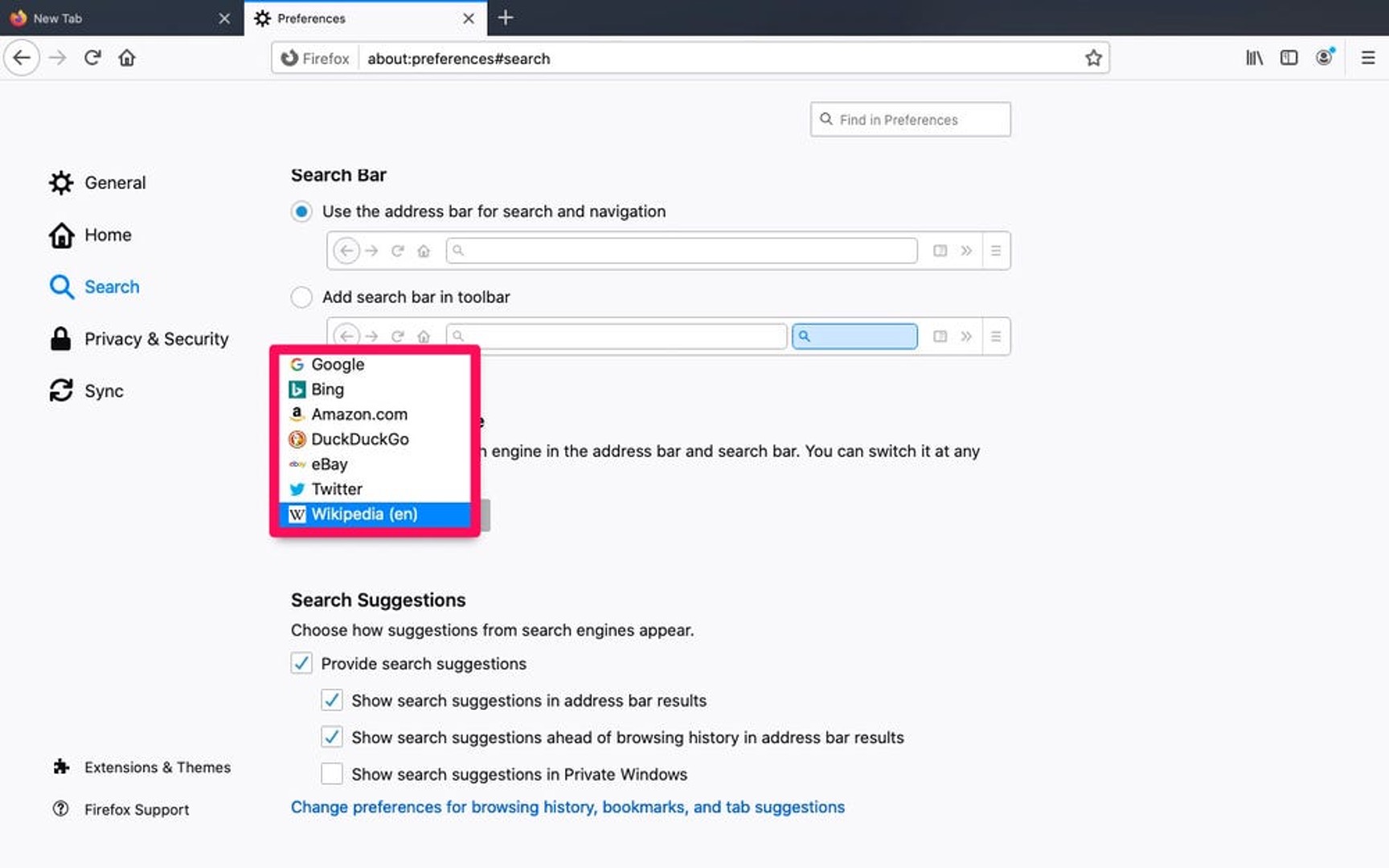Introduction
When you open your web browser, the default search engine plays a crucial role in your online experience. For many users, the default search engine is the gateway to the vast realm of the internet. In the case of Firefox, one of the most popular web browsers, the default search engine has been a topic of interest and discussion. Many users have wondered why Firefox defaults to Bing as its search engine, especially when other options like Google and Yahoo are widely popular.
In this article, we will delve into the reasons behind Firefox's choice of Bing as the default search engine. We will explore the history of Firefox's search engine defaults, examine the factors that led to the selection of Bing, and discuss the impact of this decision on users. Additionally, we will provide insights into how users can change the default search engine in Firefox to better suit their preferences.
Understanding the rationale behind Firefox's default search engine choice can shed light on the dynamics of web browser development and the considerations that influence user experience. Let's embark on a journey to uncover the intricacies of Firefox's search engine defaults and gain a deeper understanding of the factors at play.
History of Firefox search engine defaults
Since its inception, Firefox has undergone several transformations in its default search engine preferences. In the early days of the browser, Google was the default search engine for Firefox. This partnership between Mozilla, the developer of Firefox, and Google was a significant aspect of the browser's identity. It provided users with seamless access to Google's powerful search capabilities, aligning with the browser's commitment to delivering a user-friendly and efficient web browsing experience.
However, as the digital landscape evolved, so did the dynamics of web browser development. In 2014, Mozilla announced a strategic shift in its default search engine choice, marking a departure from the long-standing partnership with Google. This pivotal decision led to the adoption of Yahoo as the default search engine for Firefox in the United States, reflecting Mozilla's efforts to explore new avenues for collaboration and innovation.
The transition to Yahoo as the default search engine was a notable development, signaling Mozilla's openness to diversifying its partnerships and exploring alternative search engine options. This move also underscored the evolving nature of the web browser industry, where competition and strategic alliances played a crucial role in shaping user experiences.
Subsequently, in 2017, Firefox once again recalibrated its default search engine preferences. This time, the browser embraced a new partnership with Google, reinstating Google as the default search engine for Firefox. This realignment reflected the dynamic nature of the web browser landscape, where strategic partnerships and user preferences influenced the selection of default search engines.
Amid these shifts, the choice of Bing as the default search engine for Firefox in certain regions emerged as a noteworthy aspect of the browser's evolution. While Google remained the default search engine in many regions, the inclusion of Bing as an alternative default search engine underscored Mozilla's commitment to offering diverse search options to users, catering to a range of preferences and needs.
The history of Firefox's search engine defaults reflects the intricate interplay of technological advancements, user preferences, and strategic partnerships. It highlights the dynamic nature of web browser development and the continuous efforts to enhance the browsing experience for users worldwide. Understanding this history provides valuable insights into the factors that have shaped Firefox's default search engine choices over time.
Reasons for Firefox defaulting to Bing
The decision to default to Bing as the search engine in certain regions stems from a combination of strategic considerations and user-centric principles. While Google remains the default search engine in many regions, the inclusion of Bing as an alternative default search engine reflects Mozilla's commitment to offering diverse search options to users, catering to a range of preferences and needs.
-
Diversification and Competition: By incorporating Bing as a default search engine in specific regions, Firefox aims to foster healthy competition in the search engine landscape. Diversifying the default search engine options allows users to explore alternative search experiences, promoting innovation and choice within the browser ecosystem.
-
Strategic Partnerships: The selection of Bing as the default search engine in certain regions aligns with Mozilla's strategic partnerships and collaborations. These partnerships play a pivotal role in shaping the default search engine preferences, taking into account factors such as user demographics, regional preferences, and market dynamics.
-
User Preferences and Localization: Mozilla's decision to default to Bing in specific regions reflects a nuanced understanding of user preferences and localization. By offering Bing as the default search engine in these regions, Firefox seeks to provide a tailored and localized browsing experience that resonates with the unique needs and search habits of users in those areas.
-
Privacy and Data Protection: Mozilla's commitment to user privacy and data protection also influences the choice of default search engines. In some regions, where Bing's privacy features and data protection measures align with Mozilla's principles, defaulting to Bing serves as a means to uphold these critical aspects of user experience.
-
Inclusive Access to Information: By integrating Bing as a default search engine, Firefox aims to ensure inclusive access to information for users across diverse regions. This approach underscores Mozilla's dedication to fostering an inclusive web browsing environment, where users can access a wide range of search resources that cater to their specific needs and preferences.
-
Market Dynamics and User Experience: The selection of Bing as the default search engine in specific regions reflects an intricate analysis of market dynamics and user experience. Factors such as search relevance, localized content, and user engagement contribute to the decision-making process, ensuring that the default search engine aligns with the browsing habits and expectations of users in those regions.
In essence, the reasons for Firefox defaulting to Bing as the search engine in certain regions encompass a multifaceted blend of strategic, user-centric, and market-driven considerations. This approach underscores Mozilla's commitment to offering a diverse and tailored browsing experience that resonates with the unique needs and preferences of users across the globe.
Impact on users
The default search engine in a web browser significantly influences the online experience of users, shaping their access to information, search capabilities, and overall browsing convenience. In the context of Firefox defaulting to Bing in certain regions, the impact on users encompasses several dimensions that directly affect their browsing habits and search interactions.
Search Experience and Familiarity
For users accustomed to a specific search engine, the default selection in Firefox can influence their search experience and familiarity. The transition to Bing as the default search engine may prompt users to adapt to a new search interface and algorithm, potentially impacting their search efficiency and comfort level. This shift in familiarity underscores the significance of the default search engine in shaping user habits and interactions within the browser environment.
Localization and Relevance
The impact of defaulting to Bing extends to the localization and relevance of search results for users in specific regions. Bing's approach to localized content and regional search relevance can directly influence the search outcomes experienced by users. This localization aspect plays a pivotal role in ensuring that users receive search results tailored to their geographic context, enhancing the overall relevance and utility of their browsing experience.
User Choice and Customization
While the default search engine serves as the initial search option for users, Firefox's commitment to user choice and customization empowers users to tailor their browsing experience according to their preferences. The impact on users lies in the ability to easily customize the default search engine, providing them with the flexibility to align their browsing environment with their preferred search engine, thereby enhancing their sense of control and personalization.
Privacy and Data Protection
The impact of defaulting to Bing also intersects with user privacy and data protection considerations. For users who prioritize privacy features and data protection measures, the default search engine's alignment with these principles can significantly influence their trust and confidence in the browsing environment. This impact underscores the critical role of the default search engine in shaping users' perceptions of privacy and security within the browser.
Access to Alternative Search Experiences
By defaulting to Bing in specific regions, Firefox introduces users to alternative search experiences, expanding their search horizons and promoting diversity in search engine usage. This impact empowers users to explore the features and capabilities of Bing, fostering a broader understanding of the search landscape and enabling them to make informed choices based on their preferences and search requirements.
In essence, the impact of Firefox defaulting to Bing as the default search engine encompasses a spectrum of influences that directly shape users' search experiences, localization dynamics, privacy considerations, and access to diverse search options. Understanding these impacts provides valuable insights into the nuanced interplay between default search engine preferences and user interactions within the Firefox browsing environment.
How to change the default search engine in Firefox
Changing the default search engine in Firefox is a straightforward process that empowers users to customize their browsing experience according to their search preferences. Whether you prefer Google, Yahoo, DuckDuckGo, or any other search engine, Firefox offers a seamless method to modify the default search engine settings. Here's a step-by-step guide to changing the default search engine in Firefox:
-
Accessing Search Preferences: To begin, open your Firefox web browser and navigate to the upper-right corner of the browser window. Click on the magnifying glass icon in the search bar to reveal the search engine options.
-
Selecting a New Search Engine: Once the search engine options are displayed, click on the current default search engine's icon or name. This action will open a drop-down menu showcasing a list of alternative search engines available for selection.
-
Choosing Your Preferred Search Engine: From the list of available search engines, choose your preferred search engine by clicking on its name or icon. Whether you opt for Google, Yahoo, Bing, or any other search engine, Firefox provides a diverse array of options to cater to your search needs.
-
Confirming the Change: After selecting your preferred search engine, Firefox will prompt you to confirm the change. Click on the "Change" or "Set as Default" button to finalize the modification. This action will update the default search engine setting, ensuring that your chosen search engine becomes the primary option for all future searches within Firefox.
-
Verifying the Update: To verify that the default search engine has been successfully changed, perform a test search using the Firefox search bar. The search results should reflect the capabilities and interface of your newly selected search engine, confirming that the default search engine modification has been implemented.
By following these simple steps, you can effortlessly change the default search engine in Firefox, tailoring your browsing experience to align with your preferred search engine's features and functionalities. This customization empowers you to engage with the web on your terms, ensuring that your search interactions within Firefox resonate with your individual preferences and search habits.
In essence, Firefox's flexibility in allowing users to change the default search engine underscores the browser's commitment to user choice and customization, enhancing the overall browsing experience and promoting a personalized approach to search interactions.

























